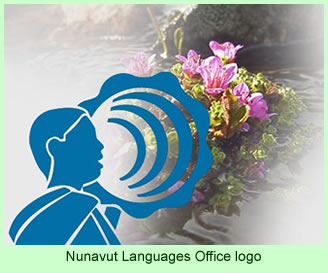Last Friday, February 28, the government of Nunavut concluded a two week celebration of Inuit native languages that began on Monday, February 17. The Nunavut Languages Commissioner, Sandra Inutiq, expanded what had previously been a one-week annual celebration into two weeks of activities. The point was to get school children more involved with using their language.
 Ms. Inutiq’s opening message for the affair was to urge the Inuit people to use their languages in all possible circumstances. “I think almost all of us share that vision of wanting to keep our language,” the commissioner said.
Ms. Inutiq’s opening message for the affair was to urge the Inuit people to use their languages in all possible circumstances. “I think almost all of us share that vision of wanting to keep our language,” the commissioner said.
The Department of Culture and Heritage of Nunavut launched a collection of multimedia works on its website on Feb. 17, all in Inuktut, a term which the government now uses for both of the Inuit languages used in the territory, Inuktitut and Inuinnaqtun. The agency promised to deliver either print or recorded versions of its new works to public libraries and schools throughout the territory.
Educators agree that school children need to have printed and audiovisual materials in their own native languages if they, and the cultures they represent, are to be taught in the schools and preserved in the society. A news report in early February discussed this issue in light of a new dictionary of Ju/’hoansi and the importance that the Ju/’hoan people place in teaching their language in written form to their children. The Inuit clearly feel the same way.
Commissioner Inutiq commented on the fact that the previous language celebrations had occurred during the mid-winter school breaks, but she decided to change that. “Every single year it’s coincided with children not being in school,” she said. “And it kind of defeats promoting the language. . . . We don’t want a whole important part of our society to miss out.”
One of the publications issued for Inuit children in Inuktut is called Ilarnaqtut!, a comic book prepared by 10 Inuit authors. Also available in Inuktut in print and online are a series of birthday songs, issued both on a CD and online, and a small dictionary for health professionals issued in print format and on the website.
The commissioner expressed her alarm at the disappearance of the native languages. “We now have communities like Iqaluit, like Rankin Inlet, Resolute, Baker Lake, Gjoa Haven, where if we don’t start to do anything about it now, we’re in danger of losing our languages,” she said. “So it’s good to gather, and validate why it’s important to protect our languages.”
The website of the Commissioner has a copy of a news release issued for Inuit Language Weeks, which should properly be called Uqausirmut Quviasuutiqarniq. She states, “I challenge Inuit language speakers to proudly speak as much of their language to other speakers as they can for the duration of the celebrations and onwards. And for the limited Inuit language speakers to go beyond their comfort zone and try to speak!”
The press release listed a variety of suggested activities that groups and schools could engage in to show their interest in and commitment to their language. It described a media campaign, a phone-in show on CBC radio, the co-launching of a film called “Millie’s Dream: Revitalization of Inuinnaqtun,” and other related activities.